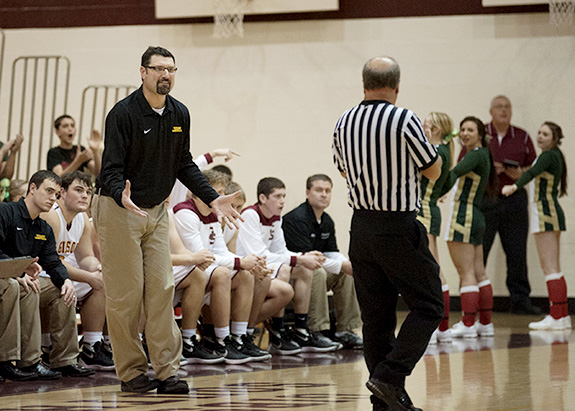Developing as an assistant coach
To be a successful athlete, a player seeks the guidance of a good coach. Likewise, for a coach to find success, they need the support of an experienced and knowledgeable coach.
Working as an assistant coach can be a powerful learning experience in developing as a coach. A head coach can provide insight on how to handle various situations, ranging from planning game strategy, motivating players, organizing practice sessions and dealing with potential distractions. Therefore, to grow and develop under the guidance of a head coach, an assistant coach may want to consider the following eight strategies.
1. Identify the right head coach.
 An assistant coach benefits the most by targeting a more experienced and knowledgeable head coach. When identifying potential head coaches, look for those with success in leading winning programs, developing players and preparing assistants for career opportunities.
An assistant coach benefits the most by targeting a more experienced and knowledgeable head coach. When identifying potential head coaches, look for those with success in leading winning programs, developing players and preparing assistants for career opportunities.
To identify the right head coach, start by compiling a list of coaching experts. This can include coaches on the interscholastic, intercollegiate or professional levels. The list may include coaches met through clinics, games, scouting, camps or recruiting events. Do not limit the list to well-established head coaches. Try to identify head coaches at all levels with a successful record of developing assistant coaches.
2. Proceed with caution.
The assistant coach should take the initiative in cultivating and developing a relationship with the head coach. However, it’s important to proceed with caution in cultivating the relationship. This means the assistant coach should understand the professional time commitments and job-related stress facing the head coach on a daily basis.
Be aware that each head coach may have a different approach to developing assistant coaches. They may act more like an expert and serve as a resource for career advancement advice, or they may serve more like a mentor, nurturing the assistant coach on the potential pitfalls facing coaches. It’s also possible they have no interest in helping to develop assistant coaches. Therefore, assistant coaches must be patient and make sure they gauge the intent and desire of the head coach before building a relationship.
3. Demonstrate passion for learning.
An assistant coach needs to demonstrate desire to learn and improve as a coach. They can do this by joining professional organizations and regularly attending clinics. Make an effort to become a member of a local state coaching associations to get access to coaching resources and make new coaching contacts.
Also, consider getting involved at the national level. Organizations typically host conferences that include courses on coaching development, personal development and ethics. For college assistant coaches, an example might be learning about the role of a recruiter. An assistant coach in an administrative role could seek the input of a recruiting coach about the ins and outs of the recruiting process. This passion for learning will be noticed by both the recruiting coach and the head coach, helping to facilitate the younger coach in being able to progress more quickly through the coaching ranks and attain a head coaching position.
4. Develop trust.
The basis for an assistant coach and head coach relationship typically begins through informal conversations at coaching clinics, summer camps or recruiting events. During these conversations, a sense of trust slowly develops.
Once trust is established, the potential for a relationship develops. To maintain trust and continue to enhance the relationship, an assistant coach should be reliable and consistent while being open and transparent in all communication. A great example of an opportunity to cultivate trust with the head coach is during meals. These informal settings can often revert to discussing Xs and Os and other coaching topics. These interactions create a mutual level of trust in their relationship and aid the assistant coach in preparing for a head-coaching job.
5. Be skilled at a variety of communication strategies.
Regardless of the communication techniques employed by the assistant coach, the approachability of head coach may require additional means of communication. Assistant coach should be skilled at using multiple communication strategies like telephone, email, texting and social media. By being able to implement a variety of methods to interact with the head coach, the assistant coach is able to select the methods preferred by the head coach.
6. Respect the head coach’s time.
During the season, the head coach and assistant coach are extremely busy organizing practices, preparing for opponents and evaluating talent. All relationships need constant and consistent communication to be successful and grow, but the assistant coach should understand that the primary responsibility of the head coach during the season is improving the team and winning games. Assistant coaches might want to make sure that informal conversations occur at opportune times (e.g., traveling to recruiting event, lunch conversations).
7. Find your niche.
When working as a subordinate under a head coach, the assistant coach has specific responsibilities related to their position. However, the assistant coach can take deliberate action to assist their head coach achieve success by finding their niche within the program.
By identifying extra roles and tasks beyond the expected responsibilities, the assistant coach increases their value to the head coach. For example, if the head coach is great teacher of the game but has limited computer skills, the assistant coach could take on the responsibility of creating documents or facilitating electronic communication. It’s always helpful if assistant coaches find a niche that increases their value to the program.
8. Don’t worry about credit.
The efforts and labor of an assistant coach often go unnoticed by those outside the program. Over time, assistant coaches may be less motivated to work for the good of the program without any public recognition for their efforts.
It’s important not to seek public recognition, as this could potentially damage the assistant coach’s relationship with the head coach. Even if the head coach fails to acknowledge the efforts of the assistant coach publicly, as long as the assistant coach is providing value to the head coach, the contributions will be recognized within the program and, in the long run, this will have a greater impact on the assistant coach’s development and career path.
Developing as an assistant coach is greatly enhanced under the guidance and insight of a head coach who has a proven record of helping assistants learn and climb the career ladder. By taking a more deliberate approach, assistant coaches can gain invaluable information, develop life-long relationships, and assist the head coach in operating a successful program. This lays the foundation for assistant coaches to eventually lead their own programs.
Dr. Chris Croft and Dr. Pete Van Mullem are former NCAA Division I college basketball coaches. Croft is currently an assistant professor of sport management at the University of Southern Mississippi. Van Mullem is currently an associate professor of sport administration at Lewis-Clark State College in Idaho.





